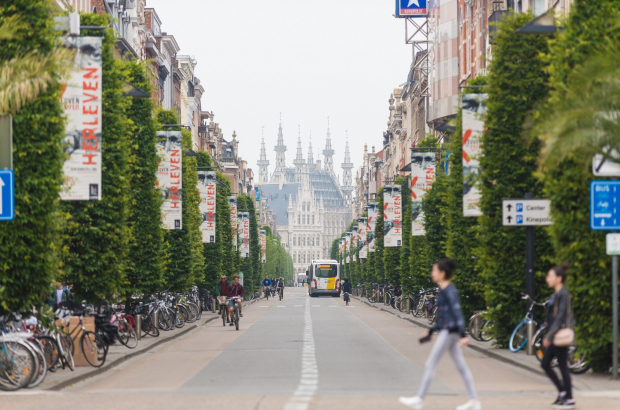- Daily & Weekly newsletters
- Buy & download The Bulletin
- Comment on our articles
'My democratic right': Why expats are voting this weekend
Belgium goes to the polls on 14 October to vote for their municipal and provincial councils. And expats will be heading there, too.
Although not eligible to vote at the provincial level, many foreigners may vote at the local, or municipal, level. According to EU regulations, all EU citizens may vote in local elections where they live. And in Belgium, non-EU citizens who have been living in the country legally for at least five years may vote in the local elections.
While they may be able to vote, getting the results of the elections in English is difficult. That’s why the next Flanders in Dialogue event is devoted to the results of the local elections. The discussion, in English, is on the evening of 15 October in Brussels’ EU district.
As local elections take place only every six years, many expats in the country temporarily choose not to exercise their right to vote. This could be the reason why fewer than 1% of registered voters in Flanders are non-Belgians. That’s only 10.5% of the potential number of foreign voters, according to figures from the Flemish department of the interior.
Well-informed
In all of Belgium, the figure is better, largely because so many of resident EU citizens live in Brussels. The 160,116 non-Belgian residents registered to vote across the country represent some 16% of potential foreigner voters.
Though these figures, as Flanders Today recently discovered, can be misleading. Not all municipalities separate resident foreigners who are eligible to vote from those who are not. So if all of them are thrown into the same pot, it muddies the statistical waters.
In any case, those foreigners in Flanders who do choose to vote – according to the official figures some 41,755 people – have often lived in the region for quite some time and are remarkably well informed about local politics.
“It’s a big election here,” says Leslie, a Canadian native who has lived in Leuven for 17 years. She’s referring to mayor Louis Tobback’s departure from the top of majority party SP.A’s list.
“Tobback has been the mayor of Leuven forever,” she says. “Mohamed Ridouani [also SPA] is running with an eye on becoming mayor. He was one of the instigators of the International School of Leuven. I appreciate his forward thinking and ideas to make Leuven a better place to live. Even a pool on the vaart!”
Not knowing that she could vote in previous local elections, Leslie registered to vote this year. She says her main reason for voting is to do what she can about “the anti-immigration rhetoric” she hears from her neighbours. “When I mention that I, too, am an economic migrant, they always say, ‘Well, not you....’”
Leslie is married to a Fleming, “but we moved here to earn more and get better health care – just like other migrants.” She says she’s pursuing citizenship now “so I can vote in all the elections”.
Declan of Tervuren, meanwhile, is voting because it’s the only shot he’s got in the democratic process. Born and raised in Dublin, he’s been in Belgium for 20 years.
“I’ve always been politically minded and interested in voting,” he says. “The Irish are one of the most disenfranchised communities in Belgium as we have no vote in Irish elections once we leave our home country. So local and European elections in Belgium are my only outlet to exercise my democratic right!”
Different nationality, same concerns
It’s his fourth time voting in city elections. “Local government in Flanders is very important and controls significant budgets, with influence over schools, parks, safety, street lighting etc, so I’m very keen to involve and educate myself.”
As he ticks off names associated with former and current city council coalitions, it becomes clear that he’s paying close attention. In fact, his political queries are the same as what you’ll hear from any Belgian.
“Something I’ve been discussing with my colleagues, who are all Flemish, is the question of thinking locally or nationally when voting in local elections. Obviously you want the best people to work for your community, but you do not want to necessarily promote their national agenda. Is a vote for N-VA in Tervuren an endorsement of Jan Jambon and Theo Francken?”
He’s also got a bone to pick with some local Open VLD representatives and yet is a fan of party founder Guy Verhofstadt, now a noted MEP. “So it’s a conundrum I’ve yet to get a clear answer on.”
In Brussels, it’s much the same, with foreigners planning to vote knowing exactly why. Terese of Sweden lives in Watermaal-Bosvoorde with her Dutch husband. “We both intend to vote in the municipal elections,” she says. “We are not happy with the ‘Payfa dynasty’ that has run Watermaal-Bosvoorde for so long, partly because of their language policies. All their communications are in French, and our Dutch-speaking children certainly don’t feel as if they live in a bilingual community.”
Hear about some of these issues and more at Local Elections: The Day After, part of the Flanders in Dialogue series, on 15 October. The event is free, but registration is required
Photo courtesy VisitFlanders



















Comments
I hoped there will be more news about the other parties. Only liberals and conservatives are making propaganda in Kraainem. Where are the left parties?
I would have signed up to vote, but since voting is obligatory in Belgium and people are fined if they don't vote, I was reluctant to become part of that system.